Xylitol is a sugar substitute that can be used to replace sugar for flavoring drinks and for adding to foods. It’s popular among keto dieters because its versatility; it can handle heat quite well, so it can even be added to cake, cookies, and other foods that need to be baked.
Our research team has ranked the ten best xylitol sugar substitutes on the market, and dug up the latest science on the benefits and side effects of using xylitol to replace sugar in your diet.
Research
Rankings
1. Morning Pep Pure Birch Xylitol
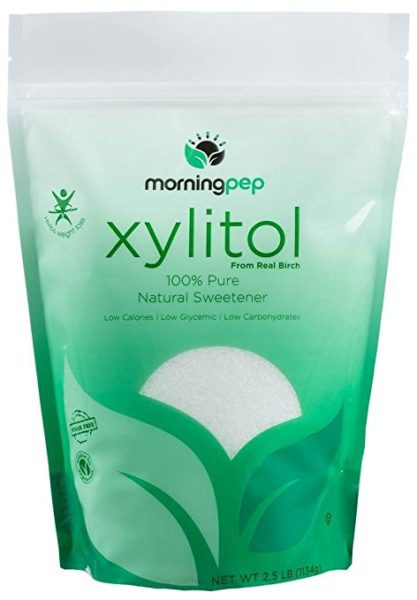
Morning Pep Pure Birch Xylitol is derived from birch trees grown in the United States. This sugar substitute comes in a 16 ounce bag that easily reseals. This quality and versatility makes it our top ranked xylitol.
2. NOW Foods Xylitol
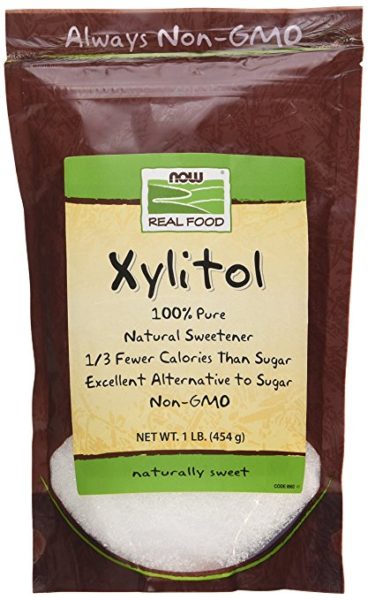
NOW Foods Xylitol comes in a resealable one pound bag that comes in a moderate-sized sugar grain that’s versatile enough for adding to drinks and for baking. It’s popular for its mild, sweet flavor and positive dental health benefits.
3. Bulksupplements Xylitol Crystals
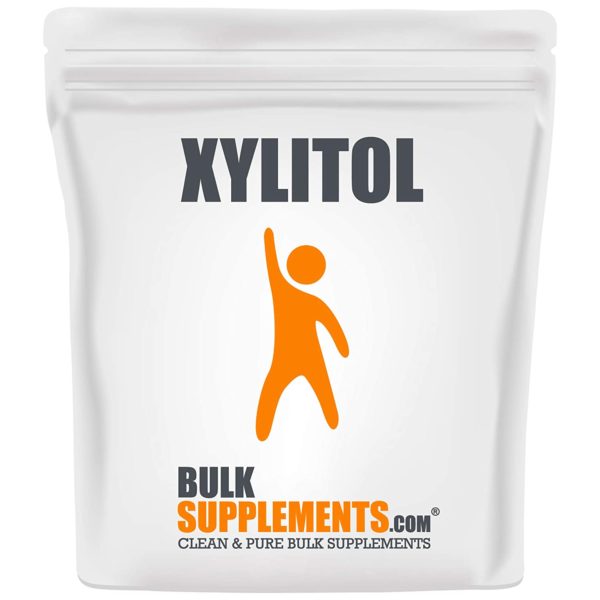
Bulksupplements is widely known for delivering quality supplements with no frills and no nonsense. That’s certainly what you are getting with this xylitol sugar substitute. This is the best option if all you need is a small amount: At 8.8 ounce, these resealable bags are great if all you use is a teaspoon or so every day in your coffee.
4. Health Garden Xylitol
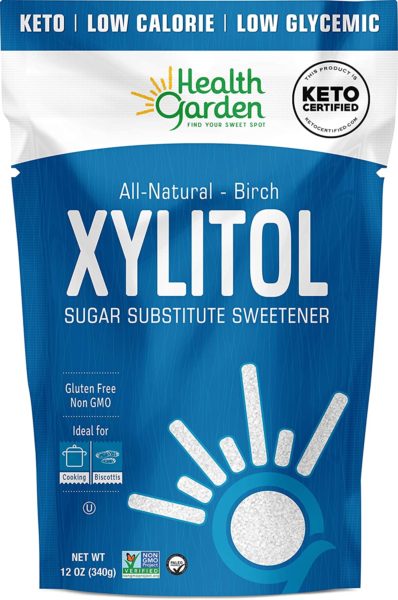
If all you need is a modest amount of xylitol, Health Garden is a decent choice. At 12 ounces per package, it’s good for the occasional user who wants to mix a teaspoon or two into their coffee, but isn’t going to cook or bake very much with xylitol.
5. KAL Xylitol
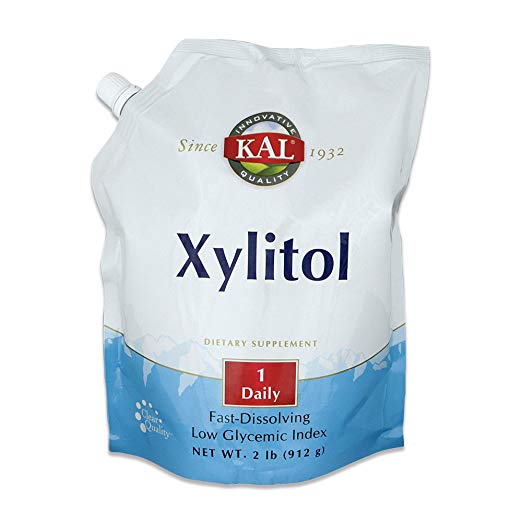
KAL Xylitol comes in a two pound bag with a unique spigot-style closure that makes it a great choice for directly adding to coffee and tea. The xylitol itself is pretty standard, but the convenient packaging certainly comes in handy.
6. Zveet Birch Xylitol
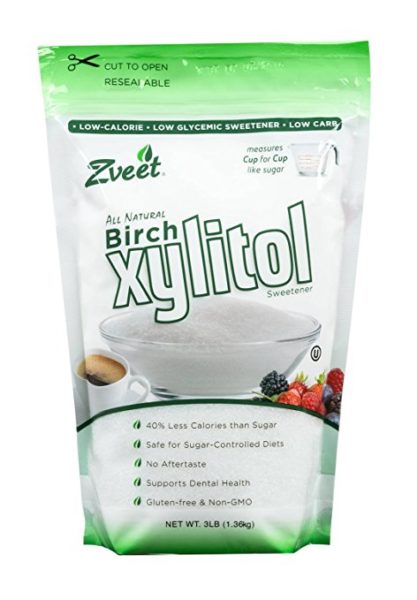
Zveet Birch Xylitol comes in a three pound bag and is derived from birch, which is a nice perk if you are looking for a more naturally-processed sugar substitute. Despite the large bag size, resealing this bag is fairly easy, so it’s a decent choice for regular users who want to have a lot of xylitol on hand.
7. Nutricost Xylitol Powder
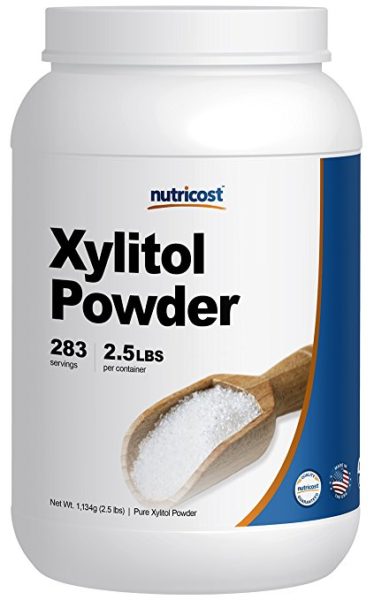
Nutricost Xylitol Powder comes in a two and a half pound tub that makes resealing and storage easy. Though not everyone has a need for this much xylitol, it’s good for people who occasionally have to cook for large groups. The plastic tub is more conducive to storage and resealing than the plastic bags most other xylitol sugar substitutes come in.
8. XyloSweet
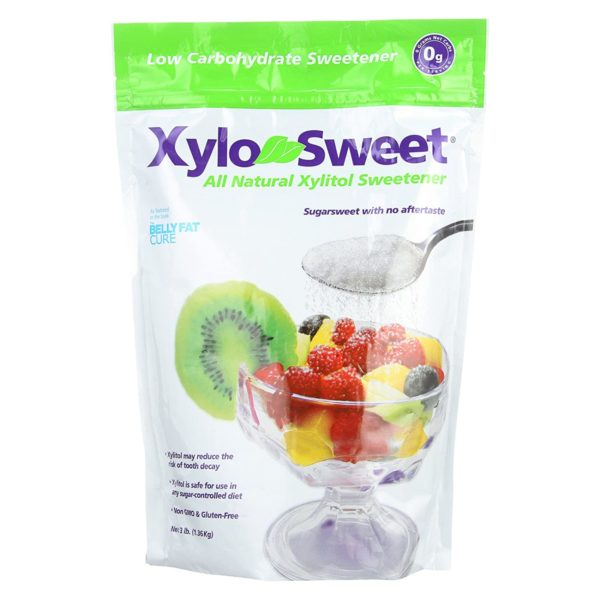
XyloSweet is a bulk-sized xylitol product that come in a huge five pound bag. If you are a heavy user, or regularly cook for large groups who are trying to cut back on their sugar consumption, this is a solid choice, but the sheer amount of xylitol included in a package of XyloSweet might be a bit much for most people.
9. Health Garden Confection Xylitol
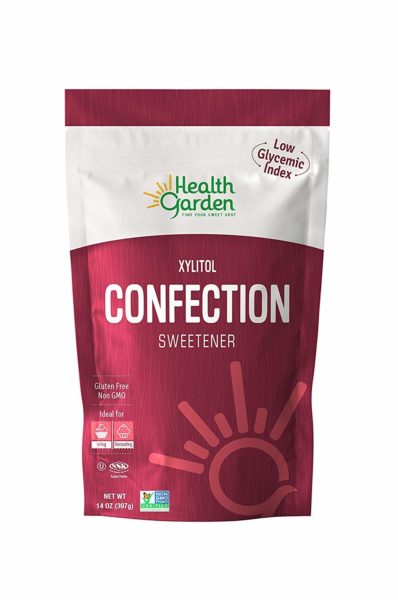
Health Garden Confection Xylitol is made especially for baking, which is a unique perk. However, large-batch bakers will struggle with the relatively paltry 14 ounce package size.
10. Xyloburst Xylitol
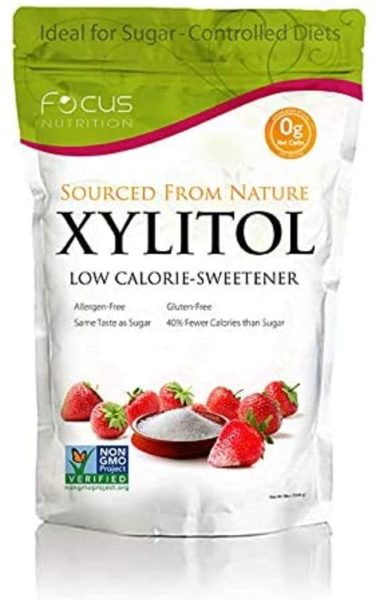
Xyloburst Xylitol is another bulk option that comes in a five pound bag. It’s well-suited for bulk users, but does not have some of the perks you’ll find in other bulk-sized xylitol options, so it’s difficult to rank much higher.
Category winners
Best xylitol overall: Morning Pep Pure Birch Xylitol
Morning Pep is an all-natural sweetener derived from birch trees, and it’s an excellent replacement for sugar whether you’re cooking, baking, or making coffee and tea. Its remarkable versatility earns it our top overall spot.
Best xylitol for baking: KAL Xylitol
KAL Xylitol comes in a bulk bag with an easy-pouring spigot that’s perfect for measuring out xylitol by volume for baking recipes. The rapid pouring spout makes it easy to cut down on calories in baked goods by substituting sugar 1:1 with xylitol.
Best xylitol for diabetics: Morning Pep Pure Birch Xylitol
Morning Pep comes in a moderate-sized one pound bag and is flexible enough for use in baked goods and hot beverages. As such, it’s perfect for diabetics looking to cut down on the glycemic index of the foods they eat.
Best xylitol for coffee and tea: Bulksupplements Xylitol Crystals
Coming in a smaller, eight-ounce pouch, Bulksupplements’ ultra-pure approach is great for users looking to swap out sugar in their tea, coffee, and other hot drinks with xylitol. Its purity and rapidly-dissolving granules mean it won’t leave sediments at the bottom of your cup.
Best xylitol for dental health: NOW Foods Xylitol
NOW Foods makes simple, straightforward supplements, and their xylitol is right in line with this reputation. For dental and oral health, NOW Foods may help cut down on cavity formations by strengthening your teeth.
Best xylitol for weight loss: Morning Pep Pure Birch Xylitol
For reducing the sugar and caloric content of your diet, you want a versatile sugar substitute. It should come as no surprise that our top pick overall shines in this department as well: for dieters with a sweet tooth, Morning Pep is a great choice.
Who should buy xylitol?
Xylitol is safe for most individuals and works great for persons trying to lose weight or that are following a low sugar or low GI type diet, like keto. Xylitol is also great for individuals who are looking to improve their dental health, as it helps to kill bacteria in the mouth.
Xylitol has not been extensively studied in children or pregnant women and should not be consumed by these populations without proper guidance from a medical professional.
How we ranked
Xylitol is popular sugar free sweetener that also helps improve dental health. As such, many companies have taken advantage and added it to popular products including toothpaste, gum and mouth wash to help facilitate dental health. While this is all well in good, for our rankings we preferred pure xylitol powder. When xylitol is added to other products, purity is often compromised, with added artificial ingredients and stabilizing agents. Anything that wasn’t pure xylitol powder, like Xyloburst and Xylosweet was axed from our list.
We also briefly considered packaging for our rankings. In general, xylitol does not need special packaging other than a resealable container or bag. As such, releasable bags or jars with measuring scoops like Nutricost and Morning Prep were rewarded. KAL also gained bonus potions for proving a very useful bag with spout to easily add xylitol to coffee, tea or other beverages.
Company reputation was also an important factor to consider. Companies like NOW and Bulk Supplements ranked exceptionally high because they performed third party testing on all their products, ensuring high quality every time.
Benefits
Xylitol has fewer calories and a lower glycemic index than sugar. Xylitol is an alternative sweetener containing fewer calories than sugar and a respectable benefit package, including a low rating on the glycemic index (GI) scale, which means your blood sugar does not rise nearly as much for a given amount of xylitol, compared to sugar.
Compared to table sugar (rated between 60 and 70 on the GI scale), xylitol clocks in at 7, which means it won’t spike blood sugar levels. (1) Sugar delivers 4 calories for every gram you ingest, and xylitol only knocks you back 2.4 calories per gram. Moreover, these calories are digested much slower, so as mentioned above, your metabolic system does not take such a heavy hit.
A naturally-occurring sweetener found in small quantities in certain fruits and vegetables, xylitol shares another attribute with sugar besides the ability to stimulate taste buds: the commercial processing renders it essentially devoid of nutrients.
So it’s still empty calories, but not as many.
Classified as a sugar alcohol, xylitol is made through an industrial process from xylan (2), a plant fiber. The designation of sugar alcohol doesn’t mean it’s intoxicating; it refers to the molecular structure, a hybrid of alcohol and sugar.
Xylitol is safe for anyone, including children and alcoholics. Xylitol looks, tastes and acts almost exactly the same as sugar, and is an excellent alternative sweetener choice.
Xylitol has a lower glycemic rating and much lower calorie content compared to sugar. At less than half the calories of sugar, xylitol is a popular choice for anyone watching carb intake. It delivers sweet flavor without spiking blood sugar levels, so it’s weight-loss friendly and easy for diabetics to incorporate into their diets. (3)
Because it doesn’t contain any fructose, the troublemaker in sugar and high fructose corn syrup (HFCS), xylitol won’t play havoc with your metabolism. (4)
Animal studies suggest xylitol could help cut back belly fat and moderate diabetic symptoms. (5, 6)
Xylitol cannot be fermented by bacteria in your mouth, so it is beneficial for dental health and oral hygiene. While sugar has always been the villain in regard to dental health, xylitol plays the opposite role, which is why dentists often recommend xylitol-sweetened gum.
Due to the way it interacts with bacteria found in the mouth, xylitol actually discourages the formation of cavities. (7) It also reduces gum inflammation, making it less likely you’ll develop gingivitis.
Streptococcus mutans, the bacteria primarily responsible for plaque formation, usually feed on glucose from food we eat. They can’t utilize xylitol, but they ingest it anyway, essentially clogging intake pathways so they end up starving and dying off. (8)
Bad bacteria levels can drop up to 75%, while the good bacteria aren’t affected. (9) One study noted a reduction in the incidence of cavities by subjects chewing xylitol-sweetened gum ranged between 30% and 80%. (10)
Xylitol offers even more oral health benefits: (11). First off, it reduces the acidity of your saliva, protecting tooth enamel from degradation and improving your smile. Xylitol also increases calcium absorption in the digestive system (12) and increases saliva production, which makes more calcium and phosphorus available for tooth remineralization.
Xylitol may help prevent ear infections. Ear, mouth and nose cavities are all connected, so the interaction between bacteria like those that cause plaque formation and contribute to dental cavities works in our favor in other areas as well.
Because xylitol feeds harmful bacteria throughout the system, it decreases the risk of developing ear infections. (13)
One study of children who suffered from recurrent ear infections showed those who used xylitol dropped the rate of infection by 40% (14), which could mean cutting doctor visits by almost half.
Xylitol discourages growth of yeast infections caused by candida. Candida albicans is a yeast or fungus that occurs normally in the body at low levels. Certain medications like antibiotics or steroids upset the balance, leading to overgrowth in warm, moist places like the throat and mouth. (15)
Infants, the elderly and anyone with a compromised immune system are especially vulnerable, and the condition can lead to serious health issues.
While other sugars containing fructose, maltose and glucose encourage the growth of oral candida albicans yeast, xylitol does the opposite.
Candida yeast establishes itself in the mouth and throat through adhering to epithelial cells lining surfaces; xylitol decreases the ability of candida albicans to attach, making it more difficult for an overgrowth to occur. (16)
Xylitol can increase your body’s collagen production. We have more collagen in our bodies than any other protein, concentrated mostly in connective tissues and skin. As we age, we produce less collagen, as well as the elastin that keeps skin smooth and firm.
When collagen production drops, skin and connective tissues change in character, causing more wrinkles and sagging, as well as decreasing the skin’s natural ability to avoid sun damage. (17)
Animal studies with xylitol suggest it may be effective in bumping up collagen levels, leading to thicker and smoother skin. (18) Eating sugar has exactly the opposite effect: it decreases the synthesis of collagen and prematurely ages the connective tissue in your body
Xylitol is potentially helpful for maintaining bone health. Osteoporosis is the most common metabolic bone disease in America, affecting up to half of post-menopausal women. (19)
Bone density decreases with osteoporosis, making fractures more likely.
While the effects of xylitol on human bone mass haven’t yet been tested, rats fed xylitol increased bone mass and bone mineral levels. (20) Researchers believe constant low levels of xylitol may also help minimize age-related bone deterioration in humans, though the precise mechanism in play is not clear.
Xylitol can feed beneficial gut bacteria. Health and nutrition research has increasingly focused on the probiotic bacteria in your stomach and intestines; these bacteria appear to be linked to everything from your immune system function to your overall levels of inflammation.
The beneficial effects of cultivating healthy bacterial colonies in the gut are becoming more widely understood, and xylitol can play a positive role.
In tests comparing the response of humans and rats to xylitol feeding, changes in gut bacterial activity were small, but fecal measurements made significant positive shifts. (21) Xylitol appears to act much like a soluble fiber on this level, as it gives beneficial bacteria additional nutrients that they need to multiply and outcompete undesirable bacteria in your gut.
Side effects
Xylitol is reasonably priced and widely available. Moderation is important during introduction; too much can cause digestive distress, including gas, bloating or diarrhea. (22)
Most people don’t have problems starting with a small amount over the first few days. Children should do fine with up to 20 grams of xylitol daily.
However, xylitol can cause gastrointestinal disturbances when consumed in large amounts, so you may want to hesitate before you completely replace all of the sugar in your diet with xylitol if you are a heavy sugar consumer. These symptoms do not typically appear until you consume very large amounts of xylitol, though (on the order of 100 grams per day or more).
If you have a dog, make sure it doesn’t get any food containing xylitol; if you think it might have ingested a small amount, see your vet immediately.
Canine systems react differently than humans, secreting large amounts of insulin, triggering uptake of glucose from the bloodstream that can lead to low blood sugar, which can be fatal (23).
FAQ
What is xylitol? Xylitol is a chemical compound that is found naturally in a variety of fruits and vegetables including mushrooms, cauliflower, and strawberries, that’s commonly used as a natural sugar substitute. Like erythritol, xylitol is a sugar alcohol that mimics the flavor of sugar without resulting in the same detrimental health effects. One gram of xylitol contains about 2.4 calories, which is significantly lower than the calorie count for table sugar.
Is xylitol good for you? Xylitol is one of the best options when it comes to natural sweeteners providing a taste and sweetness similar to sugar.Some studies show that xylitol may offer dental benefits and improved dental health by reducing the chances of developing cavities and tooth decay. Xylitol is exceptionally beneficial to those looking to lower their blood sugar levels or begin the process of losing weight. Xylitol also allows diabetics to consume sweeter tasting foods without risking a drastic change in blood sugar levels and requiring added maintenance of insulin levels. Some studies show that xylitol may help with anti-aging skin effects, increased bone density, reduction of bad bacteria within the digestive tract, and constipation relief (24).
Does xylitol contain a lot of calories? Xylitol contains about half the calories of regular sugar (2.4 calories per gram, as compared to 4 calories per gram).
Is xylitol cancer-causing? As of right now, there are no scientific studies confirming a connection between xylitol and the cancer in the human body.
Is xylitol an artificial sweetener? By definition, an artificial sweetener is manufactured to be sweeter than table sugar while possessing nearly zero calories. While xylitol is commonly referred to as an artificial sweetener, most consider xylitol to be a natural sweetener that just happens to be used to replace sugar. Xylitol does not meet the standards of the definition for “artificial sweetener” and is better described as a “natural sugar substitute” rather than an artificial sweetener.
What common foods contain xylitol? Xylitol is a relatively common ingredient in sweet foods and beverages. Some products that may contain xylitol include candy, chewing gum, chocolate, flavored beverages, and peanut butter. Xylitol is also naturally found in mushrooms, berries, and cauliflower, among other plants. Additionally, there are toothpaste products on the market that include xylitol as a major ingredient.
Is xylitol good for keto? Xylitol is a keto-friendly sugar substitute. Though xylitol is not a zero-carb additive like some other sweeteners, it does not cause an increase in blood sugar levels, making it keto friendly.
Is xylitol safe for long-term consumption? There are currently no long term scientific studies that have connected xylitol to the development of health conditions. However, like any sweetener or additive, excess consumption could potentially lead to the development of side effects or future health conditions.
Is xylitol a safe alternative to sugar? Yes, xylitol may be a safer and healthier alternative to table sugar. Like other sugar alcohols, xylitol does not cause a drastic spike in blood sugar levels when consumed. When suffering from conditions such as diabetes or obesity, doctors will often recommend avoiding or limiting sugar intake to improve overall health.
Does xylitol have the same negative health effects as sugar? One of the greatest benefits of xylitol is that it offers a level of sweetness similar to sugar without the negative effects associated with sugar consumption.
Is xylitol a laxative? While consuming xylitol in moderate doses does not directly lead to a laxative effect, frequent consumption of larger amounts has been shown to increase the chances of experiencing diarrhea. Therefore, it is recommended to consume xylitol in smaller amounts to prevent experiencing a laxative effect.
Does xylitol kill bacteria in the mouth? Xylitol not only helps to prevent tooth decay and the development of cavities, but also reduces the number of bacteria found in the mouth to promote good dental health. Specifically studies show that xylitol reduces the incidences of cavities and tooth decay by more than 30% (25). For this reason, it is not uncommon to see xylitol used as a sweetener in chewing gum and toothpaste.
Why is xylitol toxic to dogs? Xylitol is an extremely toxic substance to dogs and will likely cause hypoglycemic episodes that require intense medical treatment. When dogs consume a product with xylitol as an ingredient, the physiological response in the dog’s body is to release a substantial amount of insulin. As the insulin is released into the bloodstream, the dog’s blood sugar levels drop significantly and cause a hypoglycemic episode. This typically occurs within an hour of the dog consuming the xylitol and if not treated immediately, this condition can prove fatal for any dog (26). The human body can adapt to these changes in insulin and blood sugar levels, but dogs are not intended to consume sweetened food.
How bad is xylitol for you? Xylitol is generally safe to consume, offers very few side effects to those who use it and is approved as a food additive by the Food and Drug Administration (FDA). Most effects associated with xylitol consumption are relatively minor, including upset stomach, diarrhea, and flatulence. A person who is allergic or has an intolerance to xylitol may experience more severe effects. It’s recommended that you consume xylitol in small portions initially to see if your body reacts negatively to the sweetener.
What is the difference between xylitol and erythritol? Xylitol and erythritol are both sugar alcohols used as a sugar substitute and have similar effects on the body. They are both connected to improved oral health and are great sugar substitutes for those suffering from diabetes. Xylitol is connected to a decrease in bacteria in the mouth, ears, and nose, while erythritol is often thought to have antioxidant properties.
Is sucrose, fructose, or glucose present in xylitol? Xylitol does not contain any type of actual sugar in its makeup, including sucrose, fructose, and glucose. While xylitol may act similar to and taste like these sugars, they are not connected to xylitol in any way.
What is the maximum amount of xylitol humans can consume? The intensity of effects that xylitol has on a person greatly depends on how much they consume, their bodyweight, metabolism, and other health conditions. Because there are no significant side effects caused by the consumption of xylitol, there is no set limit for how much a person should consume in an average day. That being said, the general recommendation is to consume fewer than 50 grams of xylitol per day.
How does xylitol compare to sugar? Compared to sugar, xylitol falls lower on the glycemic index scale and has around half the calories. Despite this, it still provides a strong sweet taste, making it ideal for people craving sugar but want to watch their weight. It’s also great for diabetics who need to manage blood sugar levels.
Does xylitol contain fructose? No, xylitol doesn’t contain any of the metabolism damaging sugar fructose.
Why is xylitol affect cavity formation? Unlike sugar, xylitol cannot be fermented by bacteria in your mouth, reducing the opportunity for cavities to arise by up to 80%. Furthermore, It also prevents gingivitis by reducing gum inflammation.
Does xylitol kill good bacteria? No, xylitol doesn’t affect good bacteria but can kill up to 75% of bad bacteria.
Does xylitol reduce plaque? Xylitol doesn’t reduce plaque, but it may reduce the possibility of it forming by starving the bacteria primarily responsible for plaque formation, Streptococcus mutans.
What benefits does xylitol have on your oral health? Xylitol provides a few positive benefits to your oral health. It can improve your smile and protect tooth enamel by reducing the acidity of your saliva. Furthermore, xylitol improves tooth remineralization by increasing the availability of calcium and phosphorus in the mouth.
Does xylitol reduce ear infections? Yes, xylitol may help prevent ear infections by reducing the formation of oral bacteria. One study of children who suffered from recurrent ear infections showed those who used xylitol dropped the rate of infection by 40% (14).
Does xylitol prevent yeast infections? Candida albicans is a fungus that normally occurs in the body at low levels. However, certain medications can upset the balance, leading to an overgrowth in warm, moist places like the mouth. Infants, the elderly, and anyone with a compromised immune system are especially vulnerable, and the condition can lead to serious health issues. Xylitol discourages the growth of yeast infections caused by candida. Specifically, xylitol decreases the ability of candida to attach, making it more difficult for overgrowth to occur.
Does xylitol improve collagen production in the body? Yes, xylitol can increase your body’s collagen production. When collagen levels are low, skin and connective tissues slightly degrade, causing premature wrinkles and sagging, while decreasing your skin’s natural ability to avoid sun damage.
How does xylitol affect bone health? More studies are needed to confirm this; however, animal models show that rats fed xylitol increased bone mass and bone mineral levels.
Does xylitol improve your gut microbiome? The gut microbiome is being understood as the second brain and affects everything in your body, including hormonal output, disease prevention, and even inflammation. With the overuse of antibiotics, it more important than ever to cultivate healthy bacterial colonies in the gut. Thankfully, xylitol can improve your gut microbiome by acting like soluble fiber and provide additional nutrients your beneficial gut bacteria need to multiply and outcompete undesirable bacteria in your gut.
Does xylitol cause side effects? In high doses, xylitol can cause digestive distress, including gas, bloating, or diarrhea. However, it often only occurs when xylitol is consumed in high doses, too quickly. When xylitol doses are tailored up, side effects are almost non-existent.
How does xylitol affect dogs? Xylitol is very dangerous to dogs and can potentially be lethal. If you think it might have ingested a small amount, see your vet immediately.
How many calories does xylitol contain? Xylitol contains 10 calories per one 4g teaspoon, making it 40% lighter in calories compared to sugar, despite having a relatively similar sweet taste.
Is xylitol natural? Yes, xylitol is natural and is found in various fruits and vegetables. It also occurs naturally in our bodies.
What are sugar substitutes? Sugar substitutes are lower- or no-calorie sweetener alternatives to common table sugar and include artificial sweeteners, novel sweetness like stevia, and sugar alcohols like xylitol.
Do sugar alcohol’s contain alcohol? No, there is no alcohol present in sugar alcohol’s, despite the name.
Related Articles
Recap
Xylitol is a great alternative to sugar. Its caloric content is much lower, and its glycemic index is far smaller too. This means it is not the same metabolic shock to your system that you get when you consume sugar. Further, it dissolves easily in liquid, and handles heat very well, so it’s well suited for both baking and adding to coffee or tea. It’s a great way to improve your diet if you’ve got a sweet tooth: you can add some sweetness to your food and drink without disrupting your health.
For BodyNutrition’s #1 xylitol recommendation, click here.